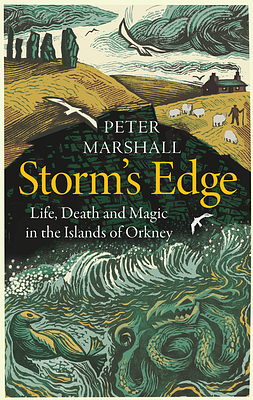Book of the Month competition: Storm's Edge

We are delighted to be able to offer five copies of Storm's Edge by historian Peter Marshall in our April Book of the Month competition, courtesy of our friends at William Collins.
To be in with a chance of winning a copy of this fascinating and accessible account of Orkney's history and people (RRP £25), all you need to do is answer the question at the bottom of the page by midnight on 30 April 2024. All entrants must reside in the UK and full terms and conditions apply.
Check out our competitions page for other giveaways.
About Storm's Edge by Peter Marshall
From Peter Marshall, winner of the Wolfson Prize 2018, Storm’s Edge is a new history of the Orkney Islands that delves deep into island politics, folk beliefs and community memory on the geographical edge of Britain.
Peter Marshall was born in Orkney. His ancestors were farmers and farm labourers on the northern island of Sanday – where, in 1624, one of them was murdered by a witch. In an expansive and enthralling historical account, Marshall looks afresh at a small group of islands that has been treated as a mere footnote, remote and peripheral, and in doing so invites us to think differently about key events of the country's history.
Q&A with Peter Marshall

How did you first get into writing?
I’ve been a professional historian for thirty-odd years now, and writing books and articles based on my research is part of the job description. Historians tend to say they prefer the research to the writing, but I’ve always enjoyed the challenge of trying to get ideas across in a coherent – and hopefully elegant and enjoyable – way. Among the subjects taught in universities, history is surely exceptional in its ability to engage and enthuse a wide public audience. I’ve never really recognised a clear distinction between ‘academic’ and ‘popular’ history. There’s just good and bad historical writing, and I like to think Storm’s Edge is an example of the former!
What can readers expect from Storm’s Edge?
My hope is that readers will learn a lot of things they didn’t know before, and also be encouraged to think differently about some things they thought they did know. Storm’s Edge is a history of Orkney in the turbulent sixteenth, seventeenth and eighteenth centuries, but it is also intended to be a history of the making of modern Scotland and Britain, viewed from the perspective of their island ‘edge’. The book casts new light on some of the great events of Scottish and British history – the Reformation, Civil Wars, witchcraft trials, Act of Union and Jacobite Rebellions – but at the same time, it tries never to lose sight of the individual human lives that shaped, and were shaped by, those often traumatic events.
What drew you to write about Orkney?
There’s a short and a longer answer to that question! The short one is that I am myself an Orcadian, born and brought up in Kirkwall, though I have been in ‘exile’ in England for over forty years now. I’m never happier than when I’m visiting Orkney, and researching the book has been a perfect excuse to do that more often. The longer answer involves a feeling that Orkney is the sort of place where you can genuinely get closer than you can elsewhere to the past and the people who lived in it. That has something to do with the nature of islands – habitats with clear and fixed boundaries where people have farmed the same fields and built in the same locations for literally thousands of years. Yet island communities like Orkney are also often remarkably ‘open’ societies, where successive waves of visitors and incomers have made a mark and found a role. Orkney is a place with a truly unique history, positioned as it is on the cultural, political and linguistic boundary between the British and Scandinavian worlds. Greater familiarity with that history helps us understand better how beliefs and identities are formed – and also, perhaps, to recognise how people can within themselves hold a range of different beliefs and live with a variety of social identities.